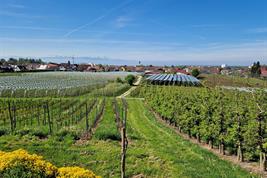26.06.2024
Press Release

A new study by the Universities of Vechta and Augsburg and the Leibniz Center for Agricultural Landscape Research (ZALF) examines the importance of sufficiency, i.e. the reduction of excessive resource consumption through climate-friendly behavior, in the climate protection concepts of 40 German pioneering municipalities. These municipalities, known as "Masterplan municipalities", received national funding to create role models for municipal climate protection. The study shows that sufficiency, e.g. switching from cars to public transport, reducing per capita living space or repairing appliances instead of buying new ones, is playing an increasingly important role in municipal climate protection strategies. However, this often remains subordinate to technological solutions - leaving further savings potential untapped. As an outlook, the authors suggest that political framework conditions should be specifically adapted in order to integrate sufficiency as a climate protection strategy more effectively into municipal action.
The study, led by Janes Grewer, Markus Keck and Jana Zscheischler, finds that sufficiency is gaining in importance as a strategy, particularly at municipal level. Nevertheless, it remains mostly a complementary approach alongside technological measures such as the use of renewable energies or the increase in efficiency. The researchers identified four main types of sufficiency approaches in the climate protection concepts of municipalities: technophiles, privatizers, visionaries and framework providers.
Four types of sufficiency
1. technophiles:For these municipalities, sufficiency plays no or only a very subordinate role compared to technological strategies.
2. privatizers:Sufficiency is seen here as a private practice for saving energy, without structural measures at municipal level.
3. visionaries:These municipalities see sufficiency as a central component of social value changes, but rarely implement concrete measures that go beyond campaigns to raise awareness or promote niche players.
4. framework providers: They recognize sufficiency as a central climate protection strategy that guides action and see sufficiency as a political field of action that is integrated into various sectors relevant to climate protection.
Jana Zscheischler, scientist at ZALF and the University of Vechta, explains: "Our joint research shows that sufficiency can play an important role in municipal climate protection. However, a stronger political framework, guiding visions, and concrete structural measures in the municipalities are needed to exploit the full potential of this strategy."
The study describes various measures and strategies that are necessary to better utilize and integrate sufficiency approaches in municipalities.
1. political and structural measures:
- Create binding framework conditions: sufficiency should be recognized as a political field of action and integrated into various sectors relevant to climate protection. Sufficiency not only affects private consumption or nutrition, but also fields of action such as construction and housing, mobility and the economy. This requires political decisions and framework conditions that support and promote sufficiency practices.
- Transdisciplinary planning: Close cooperation between local administrations, science and civil society is helpful to effectively implement sufficiency strategies. This can be achieved through transdisciplinary research projects and the involvement of change agents in the administration
2. normative and visionary perspectives:
- Incorporate visionary perspectives: In addition to concrete policy measures, sufficiency strategies should also include normative goals and social visions. This can help to open up perspectives for the necessary far-reaching transformative change that goes beyond what is currently feasible.
- Consider issues of justice: Sufficiency approaches can also help to address issues of social justice and reduce injustices. This offers the opportunity to mitigate possible resistance to climate protection measures. So far, however, such issues have hardly played a role in technically orientated municipal climate protection concepts.
3. overarching framework conditions and incentives:
- Adapting the legal framework: It is necessary to review and adapt the legal and fiscal frameworks at different levels of government to enable structural sufficiency policies at municipal level. To date, many structural incentives and regulations, e.g. at federal level, have prevented local authorities in Germany from implementing sufficiency measures.
- Incentives and tax mechanisms: At national level, sufficiency ideas have so far hardly been reflected in the funding regimes and as a governance instrument; for example, the financing of local authorities via business tax provides incentives against sufficient land saving. Financial incentives and tax mechanisms should be reorganized to support sufficiency-promoting measures and empower municipalities to establish structural sufficiency measures.
These measures and strategies show that sufficiency must be recognized and promoted as an integral part of climate change policy in order to achieve transformative change and establish sustainable practices at the municipal level. It offers valuable policy recommendations for the further development of municipal climate protection strategies.
Project partner:
- Department of Geography, University of Vechta
- Centre for Climate Resilience, Augsburg University
Funding:
This study was partly funded by the Federal Ministry of Education and Research (BMBF) as part of the junior research group "BioKum" and by the publication fund "NiedersachenOpen" as part of the funding program "zukunft.niedersachsen".
Text disclaimer:
This is a summary of the original text created with the help of artificial intelligence: Grewer, J., Keck, M., Zscheischler, J. (2024) Different interpretations of sufficiency in climate-protection strategies: a typology based on 40 pioneering municipalities in Germany. Sustainability: Science, Practice and Policy 20, 1, Article 2350216. https://doi.org/10.1080/15487733.2024.2350216 , published Open Access.
The text has been carefully reviewed and revised in the light of AI regulations at ZALF.
 Press release as pdf
Press release as pdf
Further information
Original publication:
https://www.tandfonline.com/doi/full/10.1080/15487733.2024.2350216
